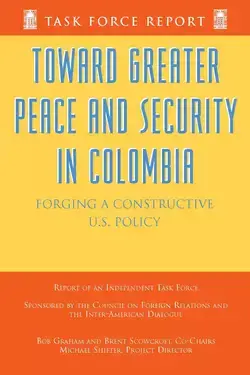
Toward Greater Peace and Security in Colombia
Forging a Constructive U.S. Policy

- Task Force Report
- Analysis and policy prescriptions of major foreign policy issues facing the United States, developed through private deliberations among a diverse and distinguished group of experts.
Colombia’s rampant lawlessness, insecurity, and corruption represent one of the major threats to democracy and economic progress in Latin America. The stakes are that high, according to this independent Task Force report. Cochaired by Senator Bob Graham and General Brent Scowcroft, the Task Force recommends a four-point strategy to respond to the deteriorating situation. Toward Greater Peace and Security in Colombia calls for a multi-track approach that supports Colombia’s efforts to achieve peace and reconciliation by helping to professionalize the country’s military forces, curtail widespread human rights abuses, strengthen political, judicial, and social reform efforts, and restore the economy.
The Task Force urges a longer-term policy that goes beyond the emphasis on fighting drugs. The country’s problems are more complex, and stem from the state’s inability to protect its citizens. The report outlines the key U.S. interests at stake in Colombia, and makes it clear that any long-term solution to Colombia’s problems will require the United States to curb its own demand for drugs. While the responsibility for finding a solution depends on the Colombians, the United States and the international community can and must assist the troubled country in its struggle for peace.
More on:
The United States needs to pursue a more vigorous multilateral approach and mobilize support from other countries in Latin America and Europe, along with relevant international bodies, to make progress in carrying out political and diplomatic efforts, combating illegal narcotics, and extending economic and trade benefits to Colombia. A comprehensive U.S. policy that brings together military, political, and socio-economic dimensions can best contribute to strengthening the legitimacy and effectiveness of the Colombian government, and to supporting its people in their fight for democracy.
More on:
 Online Store
Online Store